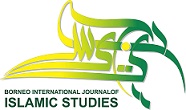Does Sharia By-Laws Damage Interfaith Harmony? The Case of Sharia By-Laws Implementation in Pamekasan, Madura
Abstract
Since the beginning of the Reformation Era in 1998, Indonesia has been transforming itself into a more liberal polity than that of in the New Order Era. This political circumstance is characterized by the freedom of opinion and the decentralization of power. During this Reformation Era, many local regulations have been enacted. One of which was sharia by-laws or local regulation based on Islamic norms in some largely Muslim populated regions. This situation has triggered concerns about the impacts of sharia by-laws over the inter-religious harmony among a very diverse society of Indonesia. This study aims to evaluate the sharia by-laws implementation in Pamekasan, Madura, and analyze its implication for inter-religious harmony. By using a qualitative approach and phenomenological descriptive analysis, it reveals that there has not been found negative impacts on the implementation of sharia by-laws since its enactment in 2001 until today. The internal and external potentials of Pamekasan residents, arguably, have become the determinant factor in keeping the by-laws in line with inter-religious harmony. These potentials include cultural-deeply rooted social capitals such as friendliness, politeness, mutual respect, and helping others. Besides, dialogue among religious elites, which is facilitated either by local government or civilian organizations, is frequently conducted and this helps to create a conducive atmosphere for all despite the existence of sharia by-laws in Pamekasan, Madura.
Keywords: sharia by-laws, interfaith harmony, social capitals.
References
Armia, Muhammad Siddiq., “Caning in Front of Public: Should it Be Maintained or Eliminated? (A Reflection of Implementation Sharia Law in Indonesia),” QIJIS (Qudus International Journal of Islamic Studies), Vol.7, No.2, December 2019.
Armia, Muhammad Siddiq., “Implementing Islamic Constitutionalism: How Islamic Is Indonesia Constitution?,” Al 'Adalah Journal, Vol.15, No.2, December 2018.
Armia, Muhammad Siddiq., “Ultra Petita and the Threat to Constitutional Justice: The Indonesian Experience,” Intellectual Discourse, Vol.26. No.2, Desember 2018.
Anfasul Marom, Ahmad, The Sharia Movements In Contemporary Indonesia, Al-Manahij, Vol. V, No. 2, Juli 2011. 155.
Dahlan, Moh., “Nilai-Nilai Kemanusiaan dalam Legislasi Hukum Islam di Indonesia”, Al-Manahij, Vol. 10, No. 2, Desember 2016.
Hanafi, Hasan, at all, Islam dan Humanisme, Aktualisasi Humanisme Islam di Tengah Krisis Humanisme Universal, Yogyakarta: Pustaka Pelajar, 2007.
Harahap, Syahrin, Teologi Kerukunan, Jakarta: Prenada Media Group, 2011.
Ismail, Faisal, Dinamika Kerukunan Antarumat Beragama, Konflik, Rekonsiliasi dan Harmoni, Bandung: Remaja Rosdakarya, 2014.
Khazin, KH. Abdul Mu’id, 1 Oktober 201 6.
M., Sirajuddin, “Sejarah Pergulatan Politik Hukum Islam di Indonesia”, Al-Manahij, Vol. 10, No. 2, Desember 2016.
Maarif, Ahmad Syafii, Islam dalam Bingkai Keindonesiaan dan Kemanusiaan Sebuah Refleksi Sejarah, Bandung: Mizan & Maarif Institut, 2009.
Machasin, Islam Dinamis Islam Harmonis, Lokalitas Pluralisme Terorisme, Yogyakarta: LKiS, 2011.
Maimun, Reformasi Pemikiran Hukum Islam, Surabaya: Pena Salsabila, 2013.
Maimun dan Ainul Haq, ”Melacak Motivasi dan Efektifitas Peraturan Daerah Bernuansa Syariah di Pamekasan”, Al-Ihkam, Vol. 13, No, 1 Juni 2018.
Misrawi, Zuhairi, Quran Kitab Toleransi, Inklusifisme, Pluralisme, dan Multikulturalisme, Jakarta: Fitrah, 2007.
Muhatadin, Mustafa, Dg. “Reorientasi Teologi Islam dalam Konteks Pluralisme Beragama (Telaah Kritis dengan Pendekatan Teologis Normatif, Dialogis dan Konvergensif)”, Hunafa Vol. 3 No. 2 Juni 2006.
Raharjo Jati, Wasisto, Permaslahan Implementasi Perda Syariah Dalam Otonomi Daerah, Al-Manahij, Vol. VII No. 2 Juli 2013
Rifai, Mien, Lintasan Sejarah Madura, Surabaya: Yayasan Lebbur Legga, 1993.
Rofiq, Ahmad, Hukum Islam di Indonesia, Jakarta: PT RajaGrafindo Persada, 2003.
Roqib, Moh., “Diseminasi Kerukunan Umat Beragama Model Pesantren Mahasiswa Di Purwokerto”, dalam Ibda’, Vol. 15, No. 2, Oktober 2017.
Smith, Wilfred Cantwell, “Orang Kristen di Tengah Pluralitas Agama”, Agama Untuk Manusia, ed. Ali Noer zaman, Yogyakarta: Pustaka Belajar, 2000.
Soleh, Achmad Khudori dan Erik Sabti Rahmawati, Kerjasama Umat Beragama dalam Quran, Perspektif Hermeneutika Farid Esack, Malang: UIN Maliki Press, 2011.
Sunaryo, Agus, Teori Inklusif Nurcholis Madjid Dan Pengaruhnya Terhadap Fikih Lintas Agama Di Indonesia, Al-Manahij, Vol. 6 No. 1 Januari 2012.
Wahid, Abdurrahman, Muslim di Tengah Pergumulan, Jakarta: LapPenas, 1981.
Wahid, Abdurrahman, “Dialog Agama dan Masalah Pendangkalan Agama”, dalam Komaruddin Hidayat, dkk (ed.), Passing Over: Melintasi Batas Agama, Jakarta: Gramedia, 1998.
Wibiseno, M. Yusuf, 5 September 2016. Wijaya, Aksin, Hidup Beragama dalam Sorotan UUD 1945 dan Piagam Madinah, Ponorogo: STAIN Ponorogo Press, 2009.
Yakin, Ayang Utriza, Islam Moderat dan Isu-Isu Kontemporer, Jakarta: Kencana, 2016.
Zainuddin, Pluralisme Agama, Pergulatan Dialogis Islam Kristen di Indonesia, Malang: UIN Maliki Press, 2010.
Zahid, Moh, 1 Agustus 2016.


.png)






